About 75 percent of a bird’s body is water, making it crucial for their survival. An adult bird needs to drink water that’s 5 percent of its body weight daily. This shows how important water is for birds’ health.
In this bird care guide, we’ll look at how birds need water. We’ll talk about the water needs of different birds, signs of dehydration, and how to keep your birds hydrated.
Key Takeaways
- Birds need water for digestion, keeping warm, and staying healthy.
- Different birds need different amounts of water, with smaller ones needing more often.
- Things like temperature, humidity, and climate affect how long birds can go without water.
- Spotting dehydration signs like tiredness, dry skin, and less eating is key to helping birds.
- Keeping water clean and fresh, and making sure water containers are clean, is vital for bird health.
Understanding Bird Hydration Basics
Birds are amazing, with almost 75% of their body being water. This high water content is key for their survival. They need clean, fresh water for digestion, keeping warm, and other bodily functions.
Components of Bird Hydration
An adult bird needs to drink about 5% of its body weight in water each day. This helps replace water lost through waste, breathing, and evaporation. Without enough water, a bird’s blood volume can drop. This makes it hard for organs like the kidneys, liver, and heart to work right.
Water’s Role in Bird Health
Water is vital for a bird’s body. It helps with digestion, keeps them cool, and supports metabolic processes. Having plenty of clean, fresh water is crucial. Without it, dehydration can cause organ failure and even death.
Daily Water Requirements
- Birdbaths should be shallow, less than 2-3 inches deep, allowing birds to drink without the fear of drowning.
- Providing a mister or dripper in a birdbath can attract more birds, as the motion of the water helps keep it cooler and inviting.
- Bird waterers are easy to use and maintain as they can be hung from trees, posts, or window ledges, providing birds with a clean and safe source of water.
- Regularly changing and keeping the water feature clean is essential to prevent illnesses in birds and deter pests like mosquitoes.
Understanding bird hydration helps us see how important water is for them. We can make sure they have access to this vital resource.
How Long Can Birds Go Without Water?
The time birds can go without water varies a lot. It depends on their species, where they live, and what they eat. Knowing how birds stay hydrated is key to keeping them healthy.
Smaller birds need to drink more often than bigger ones. They lose water fast through breathing, sweating, and droppings. For example, a healthy budgie can last up to 48 hours without food or water.
But birds in harsh places like deserts or high mountains can go even longer. Desert birds can last weeks without eating because they store fat. High-altitude birds need more food and water to avoid starving.
| Bird Species | Water-less Endurance |
|---|---|
| Tropical Birds | Up to 1 month without eating or drinking water |
| High Altitude Birds | Up to 3 times more food and 2 times more water than lower altitude birds |
| Desert Birds | Weeks without a meal due to fat reserves |
| Jungle Birds | Weeks without eating, storing food in their stomachs |
| European Starlings | A few days without feeding |
| Songbirds | A day or two longer than starlings due to fat reserves |
What birds eat also affects how long they can go without water. Birds eating wet foods need less water than those eating dry foods. The weather and seasons also play a big role in how much water birds need.
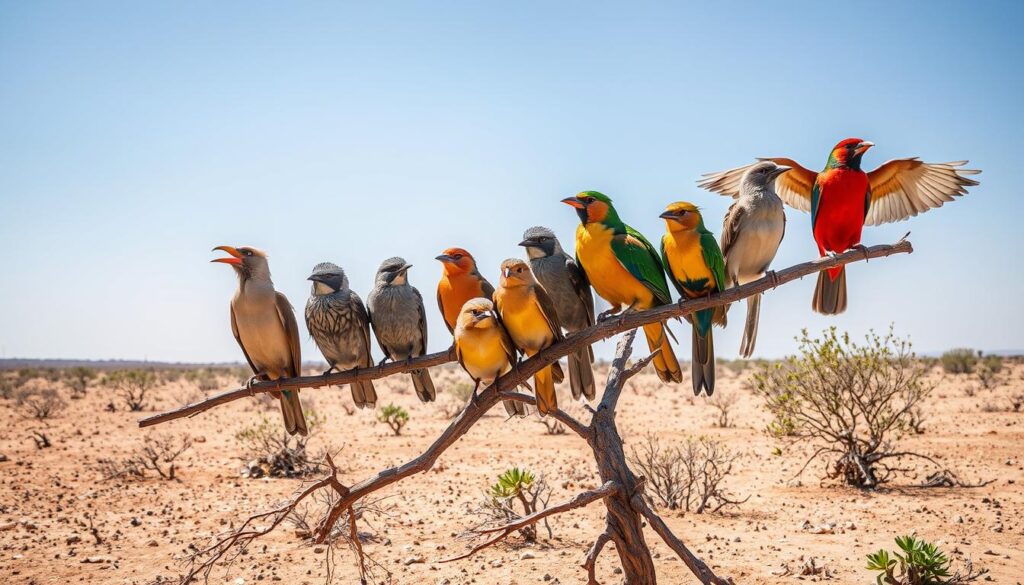
“A study suggests that a bird needs to eat about one-third of its body weight daily to survive.”
It’s very important for birds to drink enough water. Water helps them with breathing, keeping cool, and digesting food. Knowing how much water birds need helps us keep them healthy and alive.
The Importance of Water for Bird Survival
Water is key for birds, helping them survive and stay healthy. It’s needed for many things like keeping their body temperature right and helping with digestion. Without enough water, birds can’t thrive.
Metabolic Functions
Water helps carry nutrients and gets rid of toxins in birds. It’s also important for removing waste and keeping energy levels up. This keeps birds strong and healthy.
Temperature Regulation
Birds use water to stay cool, especially when it’s very hot. Drinking or bathing helps them avoid overheating. This is very important for their survival.
Digestive Processes
Water helps break down food in birds’ stomachs. This is especially true for seeds, fruits, and insects. It makes sure birds get the nutrients they need to stay energetic and healthy.
If birds don’t drink enough water, they can get tired and sick. They might not get the nutrients they need. It’s very important to make sure birds always have clean, fresh water.
“Providing a reliable source of water for birds is one of the most important things we can do to support their health and survival.”
Species-Specific Water Requirements
Different birds need different amounts of water. This depends on their size, where they live, and what they eat. Knowing these needs is key to keeping our birds happy and healthy.
Smaller birds, like finches and hummingbirds, need water more often. They drink a lot because they are very active. Birds that live in dry places drink less water because they lose less moisture.
Some birds get enough water from their food, like fruits or insects. Others, like seed-eaters, need water all the time. For example, Gouldian Finches need about 1/2 oz of water each day. Zebra Finches need 3/4 to 1 oz. Canaries and Budgies can drink from 1/4 oz to 4 oz, depending on their size and type.
Bigger birds, like African Greys and Orange Cheeked Conures, drink more water. They need about 6 oz and 4 oz each day. It’s important to watch how much water they drink because changes in their diet or medicine can affect their water needs.
Understanding each bird’s water needs is vital for their care. It helps keep them healthy and happy.
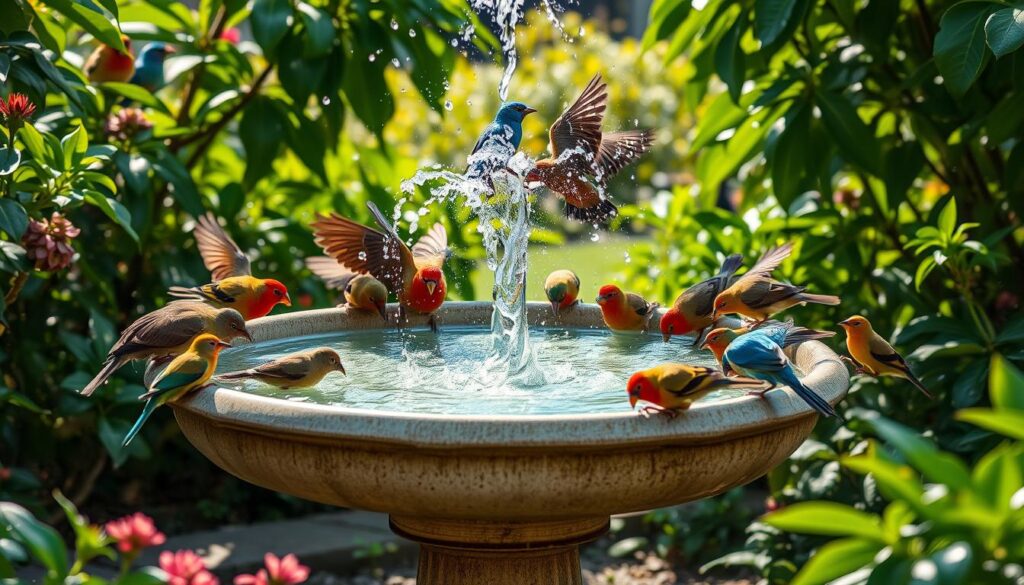
“Proper water level management is crucial for supporting bird species dependent on water for their survival.”
Environmental Factors Affecting Bird Hydration
Birds need water to survive, and the environment they live in affects this need. In hot, dry places, birds lose water fast. This is because they breathe more and move around more. On the other hand, cooler, wetter places help birds keep water longer.
Seasons also change how birds need water. The amount of water available and the birds’ needs change with the seasons.
Climate Impact
The climate where birds live is key to their water needs. In hot, dry areas, birds must work harder to stay hydrated. This makes them more likely to get dehydrated.
Having shade and places to rest helps birds save water in very hot weather.
Seasonal Changes
Seasons bring changes in weather and water availability. When it’s dry or rainy, birds face challenges finding enough water. They might have to travel far or use water that’s not safe.
Habitat Considerations
The type of place a bird lives in affects its water needs. Birds in dry areas often have special ways to save water. But, even in these places, finding water is crucial for their survival.
These factors all play a part in how long birds can go without water. Knowing what birds need in different places helps us support their health and survival.
Signs of Dehydration in Birds
It’s important to know the signs of dehydration in birds. Bird dehydration risks can be serious if not treated. Knowing the signs of avian water needs is key.
One sign is when birds seem tired or less active. They might not want to move or play. Their skin could be dry or flaky, and their eyes might look sunken.
Another sign is if birds don’t want to eat. They might look for water a lot. Birds with dehydration might also puff out their feathers to save water.
Dehydrated birds might make more noise than usual. They might also not want to fly or play. This shows they need more water.
Spotting these signs early is very important. It helps birds get the water they need quickly. This can prevent serious health problems and keep them healthy.
| Dehydration Level | Symptoms | Treatment |
|---|---|---|
| Mild (less than 5%) |
|
|
| Moderate (5-9%) |
|
|
| Severe (10% or more) |
|
|
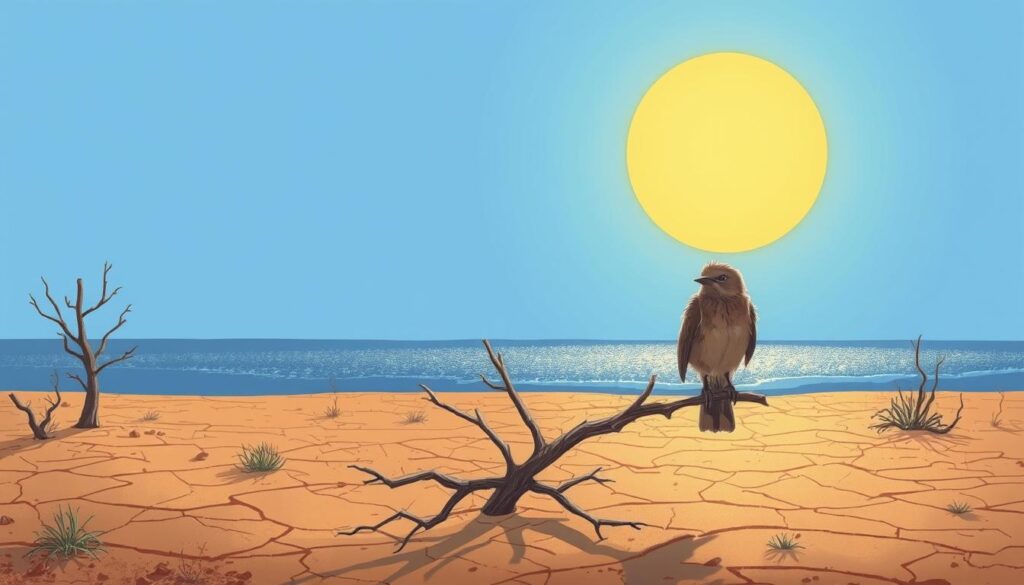
“Recognizing the signs of dehydration in birds is crucial for their health during hot seasons. Immediate action by providing fresh water is essential to prevent severe dehydration in birds.”
Water Quality and Bird Health
Keeping water clean is key for birds’ health. They need it for drinking, bathing, and staying cool. Bad water can harm them with bacteria and other stuff, causing sickness and infections.
Types of Safe Drinking Water
In cities, tap water is usually okay for birds. But well water might have too many minerals, which can hurt some birds. For these birds, filtered or bottled water is better.
Bacterial Risks
Bacteria like Pseudomonas, E. coli, and Salmonella can harm birds. They can make birds sick or very sick. It’s important to change the water often and keep it clean.
Water Contamination Issues
Water can also get contaminated with minerals or chemicals. For example, too much iron in the water is bad for some birds. It’s important to check the water and treat it if needed.
| Water Quality Factor | Potential Impact on Bird Health |
|---|---|
| Bacterial Contamination | Digestive issues, infections |
| High Mineral Content | Iron storage disease, other metabolic disorders |
| Chemical Pollution | Toxicity, reproductive problems |
By giving birds clean water, you help keep them healthy. This reduces the chance of them getting sick and helps them stay well.
Proper Water Container Maintenance
Keeping water containers clean is key for birds’ health and hydration. It’s important to follow the right steps to keep water fresh and safe for your birds. This makes sure they have clean water for bird hydration and avian water needs.
Water dishes need to be cleaned and filled up every day to stop bacteria from growing. Look for sliminess or color changes in plastic containers to spot contamination. Both bowls and bottles must be cleaned often, as bacteria can grow fast.
Proper care means washing, rinsing, and drying containers well before adding fresh water. This simple step helps keep your birds safe from health risks.
- Clean water dishes and bottles daily to prevent bacterial growth.
- Look for signs of contamination, such as sliminess or discoloration.
- Wash, rinse, and dry containers thoroughly before refilling with fresh water.
- Replenish water frequently to ensure a clean, safe supply for your birds.
By focusing on keeping your bird’s water containers clean, you help them stay healthy. Regularly checking and cleaning these containers is a big part of caring for your birds’ bird hydration needs.
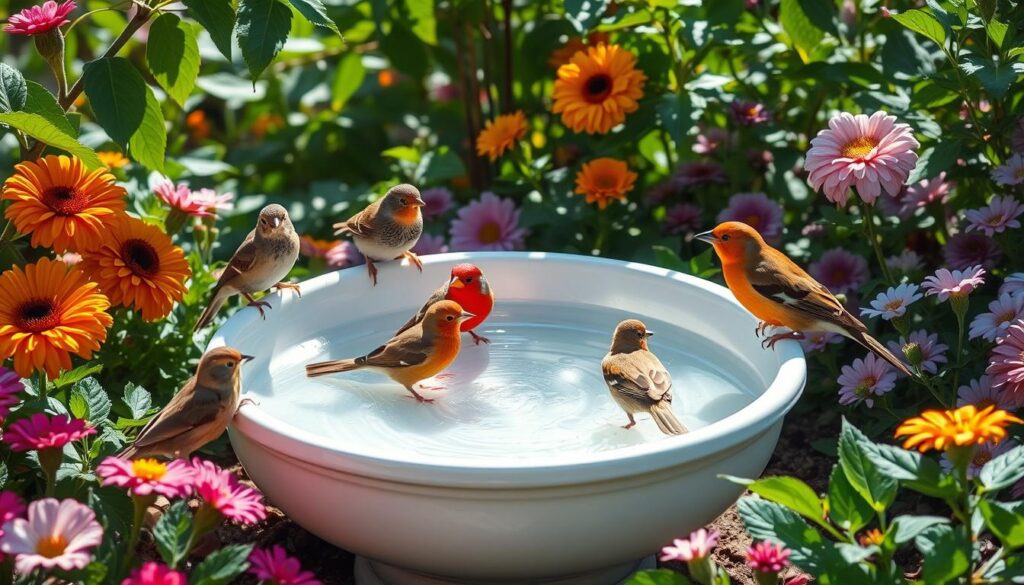
“Neglecting a birdbath can lead to it drying out completely, which is not beneficial for birds, or becoming fetid, creating a potential mosquito problem.”
– Geoffrey LeBaron
Remember, keeping water containers clean is a simple but important step. It helps your birds stay healthy and happy. By making this a priority, you’re doing a lot to help their well-being.
Emergency Care for Dehydrated Birds
Dehydrated birds need quick care. The right first aid can help a lot. But, be careful not to force-feed them, especially baby birds.
First Aid Steps
First, give a dehydrated bird a shallow dish of clean water. This lets them drink on their own. For adult birds, a shallow dish of water is okay. But, baby birds can go almost 24 hours without food or water, so don’t force-feed them.
When to Seek Professional Help
If the bird’s dehydration is bad or they have other symptoms, get help fast. Dehydration can be very serious and might need a vet. Also, birds caught by cats need quick care because cat saliva is deadly to them.
| Dehydration Risk Factors | Dehydration Symptoms | Emergency Care Measures |
|---|---|---|
|
|
|
Act fast and get help when needed to help dehydrated birds. Following these steps can help them recover well.
Water Sources in Natural Habitats
Birds in their natural homes find many water sources. They have rivers, lakes, ponds, and even dew on leaves. Some birds get water from their food, like fruits or insects.
Desert birds have special ways to live without much water. They get moisture from their prey. This shows how well they can survive without direct access to water. It’s a sign of their strong survival skills.
Knowing how birds find water is key for taking care of them. It helps us make better homes for birds and protect them in the wild. By learning how birds survive without water, we can help them stay healthy.
“Birds’ ability to find and use diverse water sources in nature contributes to their survival in different habitats.”
Having water for birds is very important. It can be a birdbath in your yard or a natural source in the wild. By understanding what birds need, we can help them live well in both places.
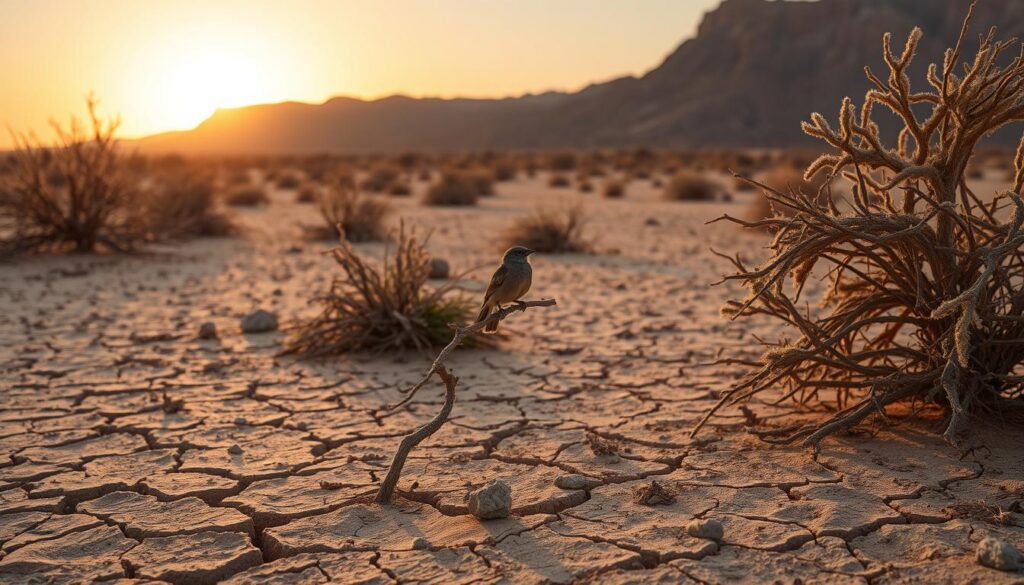
Best Practices for Providing Water to Pet Birds
It’s very important to make sure your pet birds have clean, fresh water. This is key for their health and happiness. Here are some tips to help you provide the best water for your birds.
Water Dish Selection
Look for shallow bowls or bird baths that are easy for your birds to get to. Stay away from deep containers that could be dangerous. Choose dishes made of ceramic, stainless steel, or strong plastic that are easy to clean.
Cleaning Protocols
- Change your birds’ water every day, best in the morning, to stop bacteria from growing.
- Use a mild soap and warm water to clean the dishes. Make sure to rinse well to get rid of any soap left behind.
- Even if the water bottles look clean, disinfect them every day to keep the water quality high.
- Don’t add vitamin supplements directly to your birds’ water. This can help bacteria grow.
Keeping the water clean is a big part of caring for your pet birds. They need clean water every day because they can’t get it themselves. It’s up to you to make sure they have it.
| Water Source | Recommendation |
|---|---|
| Tap Water | Generally safe, but test for hazardous bacteria, minerals, and toxins |
| Bottled Water | Store in cool, dry, dark place; check expiration date and labels |
| Distilled Water | Can be harmful due to its acidic nature and mineral depletion |
| Designer Waters | Small amounts are fine, but not recommended for daily consumption |
| Carbonated Water | Generally not preferred by birds and should not be their main source |
The best water for your pet birds is fresh, clean, and without additives. Talk to your avian vet for advice on what’s best for your birds’ hydration and diet.
Common Mistakes in Bird Hydration
Keeping our birds hydrated is key to their health. Yet, many owners make mistakes that can harm their birds. One big mistake is not changing the water often enough. Birds need fresh, clean water every day to stay healthy.
Another mistake is using dirty water or not cleaning water containers well. People think water bottles don’t need cleaning as often. But, all water containers must be scrubbed and disinfected regularly. Also, adding vitamins or supplements to the water can lead to bacterial growth if the water isn’t changed often.
- Not noticing when a bird is dehydrated or waiting too long to get vet help can be very dangerous.
- Using water with too many minerals or not giving the right water for certain birds can also harm them.
By avoiding these mistakes, bird owners can keep their birds hydrated and healthy.
| Mistake | Consequence |
|---|---|
| Infrequent water changes | Contamination and bacterial growth |
| Using contaminated water sources | Potential health issues |
| Neglecting to clean water containers | Reduced water quality |
| Adding vitamins or supplements to water | Promoting bacterial growth |
| Overlooking signs of dehydration | Serious health concerns |
| Using water with excessive minerals | Harm to specific bird species |
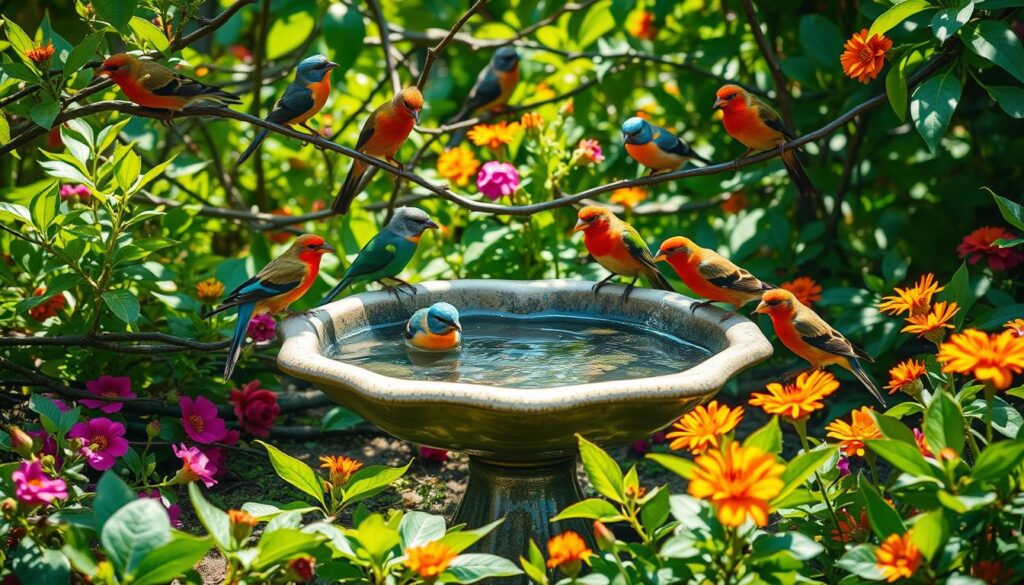
By fixing these mistakes and providing clean water, bird owners can keep their birds healthy. Proper hydration is vital for their well-being.
Seasonal Hydration Requirements
As seasons change, birds need more water. In warm months, they cool down and stay hydrated. In winter, unfrozen water is key for their survival.
Migratory birds need more water when they travel. Breeding seasons also increase their water needs. Nesting birds need extra water for their activities.
It’s important to adjust water for birds with the seasons. Knowing their water requirements for birds and bird survival without water helps. This way, we ensure they stay hydrated all year.
| Season | Water Needs | Considerations |
|---|---|---|
| Spring and Summer | Increased water requirements for cooling, hydration, and nesting | Ensure clean, plentiful water sources; consider shaded areas to prevent rapid evaporation |
| Fall and Winter | Decreased water needs, but frozen sources require unfrozen alternatives | Provide heated birdbaths or shallow, non-breakable water bowls; maintain cleanliness to prevent contamination |
| Migration Periods | Heightened water requirements due to increased energy expenditure | Strategically place water sources along migratory routes to support traveling birds |
| Breeding Seasons | Enhanced water needs for nesting, egg-laying, and chick-rearing | Ensure readily available water sources near nesting sites to support parental birds and their offspring |
Understanding seasonal water needs for birds helps us provide the right resources. This ensures their health and well-being all year.
Water Supplements and Additives
While bird hydration mainly comes from clean, fresh water, supplements and additives can add important nutrients. But, using them too much can cause problems.
Vitamins in water can make bacteria grow, which is bad for birds. If you use supplements, talk to a vet first. They can help figure out the right amount and how often to use it. Some birds might need special solutions when they’re stressed or sick. But always remember, clean water is the main thing.
Some birds, like lories and toucans, can get sick from iron in water. They need water without lots of minerals. So, use purified or filtered water to keep them healthy.
Water Supplement Considerations
- Vitamin supplements can promote bacterial growth in water
- Consult a veterinarian for proper dosage and frequency of water supplements
- Electrolyte solutions may be beneficial during periods of stress or illness
- Avoid tap water with high mineral content for species prone to iron storage disease
- Purified or filtered water is recommended for sensitive bird species
“Proper hydration is essential for a bird’s overall health and well-being. While supplements can be useful, they should be used cautiously and with guidance from a veterinarian.”
Keeping your bird hydrated is all about clean, fresh water. Supplements and additives should be used carefully. They’re only for when your bird really needs them, to keep them healthy and happy for a long time.
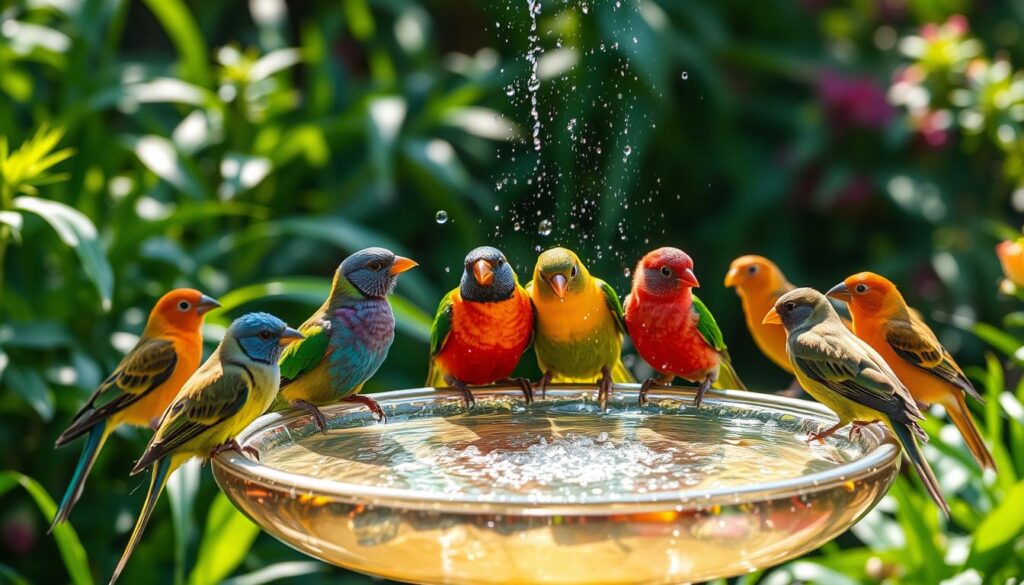
Special Considerations for Injured or Orphaned Birds
Injured or orphaned birds need special care for hydration. Keeping them hydrated is key, especially for young birds. Knowing their needs is vital for their survival.
Emergency Care Guidelines
First, keep orphaned birds warm before giving them water. Use a low-setting heating pad or a warm sock. Never force-feed water to baby birds.
For injured birds, provide a shallow water dish. But, keeping them warm and quiet is more important. Use a cardboard box with air holes for safe housing.
Get professional help right away, especially if a bird was caught by a cat. Cat saliva can be toxic to birds and needs quick vet care.
Temporary Housing Requirements
Creating a safe home is crucial for injured or orphaned birds. A cardboard box with air holes is a good, cheap option. Keep the temperature and humidity right to prevent dehydration.
For young birds, a warm spot around 100°F is best. Keep humidity between 50% and 70% to avoid dehydration. Soft bedding and quiet help them feel better.
Remember, the main goal is to keep the bird stable until you can get vet help. Bad care or waiting too long can harm the bird’s health.
Conclusion
Proper bird hydration is key for their health and survival. Knowing what birds need to stay hydrated is crucial. This includes understanding their water needs based on their size, metabolism, and environment.
Keeping water clean and fresh is essential. It’s also important to know when birds need more water due to the seasons. For pet birds, changing their water daily and keeping their containers clean is vital. If a bird gets dehydrated or injured, quick action and professional help can save its life.
Staying hydrated is important for birds’ health and longevity. This is true whether they live in captivity or in the wild. Research helps us understand how to protect birds and their habitats. It shows us how to ensure they have the water they need to thrive.
FAQ
How long can birds go without water?
Birds can survive without water for different lengths of time. It depends on their species, the environment, and what they eat. Generally, they can go from a few hours to several days without drinking. Smaller birds need to drink more often than bigger ones.
What are the components of bird hydration?
Birds are mostly water, about 75% of their body. They need to drink enough water each day to replace lost water. This is about 5% of their body weight.
What is the role of water in bird health?
Water is key for birds’ health. It helps with digestion, keeping warm, and other body functions. Birds need clean, fresh water to survive.
How much water do birds need daily?
Birds need to drink water that makes up 5% of their body weight each day. This helps replace water lost from waste, breathing, and evaporation.
What are the metabolic functions of water for birds?
Water helps move nutrients, gets rid of toxins, and removes waste. It also helps keep the body temperature right and aids in digestion.
How do temperature and humidity affect a bird’s water needs?
Birds need more water in hot, dry places. In cooler, wetter places, they can hold onto water longer. The seasons also change how much water birds need.
What are the signs of dehydration in birds?
Signs of dehydration in birds include being very tired, dry skin, sunken eyes, less appetite, and making more noise.
What types of water are safe for birds?
Tap water is usually safe in cities. But well water might have too many minerals for birds. Sometimes, filtered or bottled water is better.
How often should water containers be cleaned for pet birds?
Water dishes for pet birds should be cleaned and filled up every day. This stops bacteria from growing. Keeping the water and containers clean is very important.
What first aid steps should be taken for a dehydrated bird?
For dehydrated birds, give them a shallow dish of water or the right bird food. But don’t force them to eat or drink, especially baby birds.
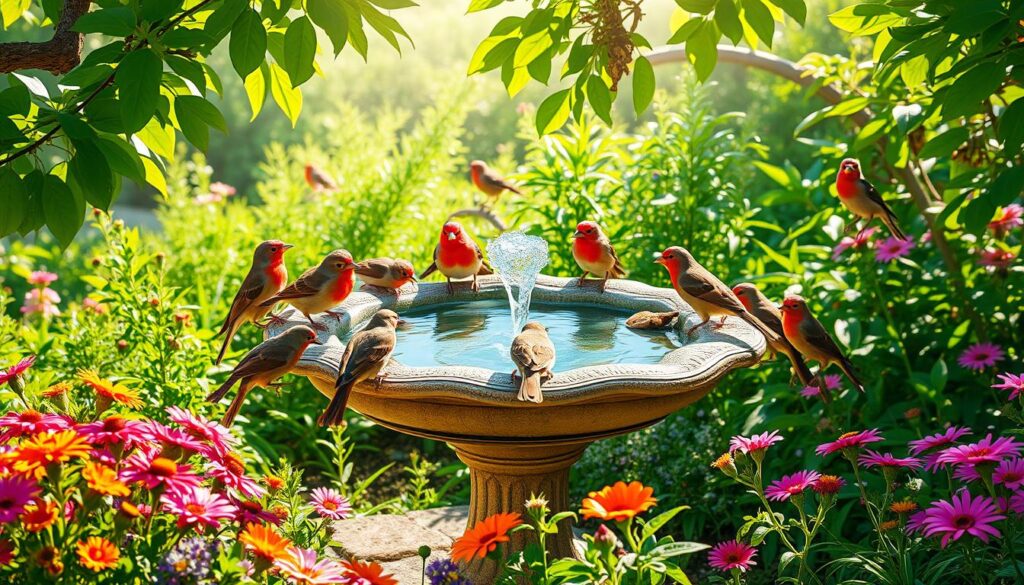
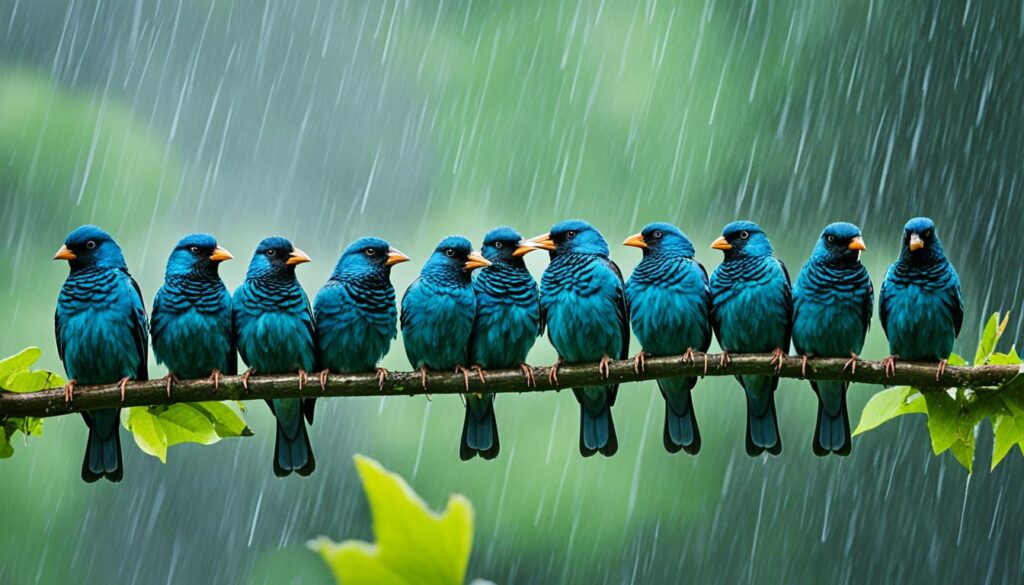
Thanks to my father who shared with me about this web site,
this blog is really remarkable.
Also visit my web-site :: nordvpn coupons inspiresensation;
cia.sh,
nordvpn cashback 350fairfax
We stumbled over here different website and thought
I may as well check things out. I like what I see
so now i am following you. Look forward to going over your web page yet again.